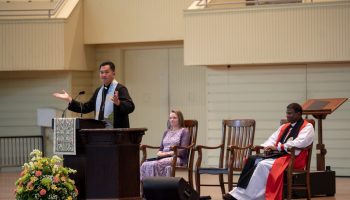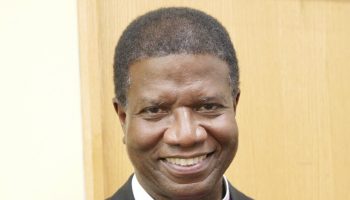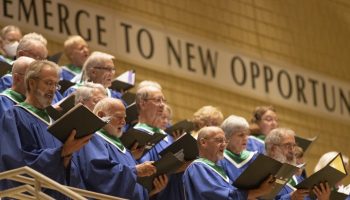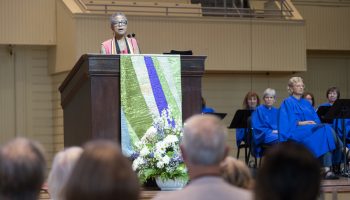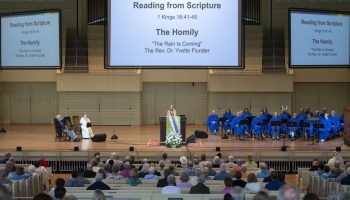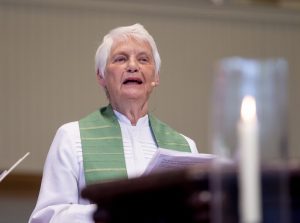
“Not everyone follows the church liturgical year, but there is a rhythm to it,” said the Rev. Barbara K. Lundblad at the 9:15 a.m. Wednesday Ecumenical Service in the Amphitheater. “There is a rhythm to the church year and there is a rhythm to preaching itself. Some of you want to hear a hard-hitting, political sermon every week, and some of you think you have heard too many already. Some of you want a pastoral sermon every week.”
Her sermon title was “Grace: An Ending We Didn’t Expect,” and the Scripture was Joel 2:1-2; 12-17. The church season was Lent.
“If you are not preaching on politics, you are not preaching on the Bible,” Lundblad said. “If you never preach a pastoral sermon, you are not preaching the Bible.”
Lundblad was a parish associate at Advent Lutheran Church at 93rd and Broadway in Manhattan. On Ash Wednesday, the beginning of Lent, many people who never went to church would come to get ashes on their foreheads.
“Many were former Roman Catholics and had never seen a woman priest,” she said. “They had their choice of me or the pastor of the church — a woman. It was either choose a woman priest or no ashes.”
During Lent, there is no “Alleluia” sung in the service, Lundblad said.
“We used to tell the children that we had hidden the ‘Alleluia’ and ask them to come back at Easter to help us find it,” she said. “We hoped they would tell their parents they had to come back at Easter to help us find the ‘Alleluia.’ ”
Instead of the “Alleluia” in the service, the priest sings, “Return to the Lord, your God, for he is gracious and merciful, slow to anger, and abounding in steadfast love.”
“Joel could have said, ‘Return to the Lord for you haven’t been in church in a long time, or you might die tonight, or you have made a mess of your life and you need to ask forgiveness, or you will be sorry if you don’t repent,’ ” Lundblad said.
Instead, the prophet gives a word of joy, that God is slow to anger and abounding in steadfast love.
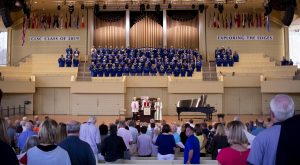
Lundblad performed a wedding for a man, Matthew, who had been a child in her church in upper Manhattan, Our Savior’s Atonement.
“I remember him at a Lenten study about the Lord’s Prayer,” she said. “He said, ‘I pray every night that I won’t go to hell.’ Now, where did he hear that? I don’t think it was from his parents and certainly not from the pulpit. Maybe from his classmates, TV, video games or maybe he heard someone say, ‘Go to hell.’ ”
Lundblad said Jesus had “hardly anything” to say about hell.
“But preachers sure have said a lot,” she said. “I would not have been surprised by that if Joel had said, ‘If you don’t return to God, you will go to hell.’ It must be in our genes.”
Philosopher Jean-Paul Sartre said that people look like they are looking at others with a suspicious stare or with a loving glance.
“When you hear the siren of the police car, do you assume it is you they are after?” Lundblad asked. “How do we feel about how God looks at us?”
Evelyn Whitehead, a psychologist, and James Whitehead, a theologian, have written about guilt. There is false guilt, where a person fails at one thing and believes that they are a failure. People lose sight of individual failures and pour their feelings onto themselves, putting their wretchedness on themselves — “my” failure.
“Those people want to hide like Adam and Eve,” Lundblad said. “But the prophet Joel says the fear in our genes is overcome by the love in God’s heart beyond anything we can imagine. And nothing, nothing can separate us from the love of God.”
Theologian Paul Tillich, in his sermon, “You Are Accepted,” said that grace strikes us when we are in great pain and restlessness, when we long for perfection and it does not appear.
Tillich said, “You are accepted by that which is greater than you. You don’t know the name, but perhaps you will find it later. Don’t do, seek, perform or intend anything. Accept the fact that you are accepted.”
Fully experiencing grace, Lundblad said, requires one to accept themselves.
“To experience grace, we have to accept ourselves because we have been accepted by that which is greater,” Lundblad said. “Return to God, who is gracious and merciful, abounding in steadfast love.”
The Rev. Scott Maxwell presided. The Rev. Vicki Burston, senior pastor at the Homer, New York, United Congregational Church, Church of Christ, read the Scripture. This is Burston’s first time at Chautauqua, but for nine years she coordinated a four-day event in Cortland County, New York, that was called “Chautauqua,” on a similar but smaller scale. The Motet Choir was singing at the Chautauqua Literary and Scientific Circle graduation in the Hall of Philosophy. Jared Jacobsen, organist and coordinator of worship and sacred music, played “O Mensch, bewein dein Sünde groß” by Johann Sebastian Bach, as the anthem. Thanks to the magic of Chautauqua and a few generous souls who connected here, braille worship service books and hymnals are now available for those who are sight-impaired to participate fully in the weekday worship services. These worship books will be available at Gate 4, the Ralph C. Sheldon Foundation Gate. Please ask any usher for assistance. The Robert D. Campbell Memorial Chaplaincy provides support for this week’s services.

